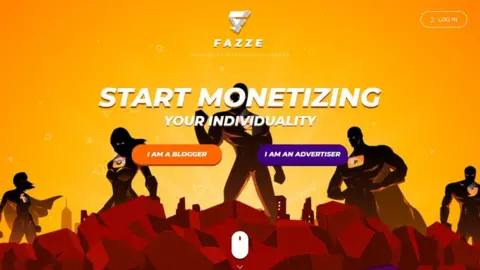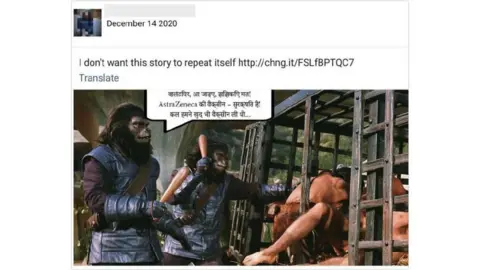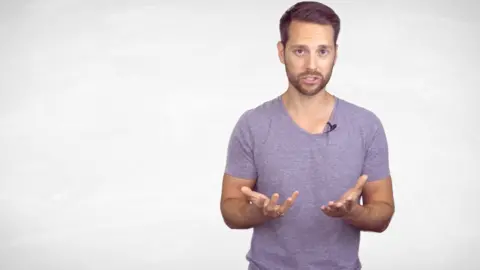Facebook removes anti-vax influencer campaign
 Fazze
FazzeFacebook has removed hundreds of accounts which it says were involved in anti-vax disinformation campaigns operated from Russia.
The company said the network of accounts targeted India, Latin America and the US.
They attempted to recruit influencers to spread false claims to undermine public confidence in particular Covid-19 vaccines, it added.
In its latest report on "coordinated inauthentic behaviour", Facebook said it found links between the network and a botched disinformation campaign from influencer marketing agency Fazze - which is part of a Russian-based company called AdNow.
Last month a BBC Trending investigation reported how in May this year influencers had been offered money by Fazze to spread false claims about the risks associated with the Pfizer vaccine.
According to Facebook, that was the second wave of attempts by the network to smear Western vaccines.
Their investigation found that from November 2020 the same network attempted to falsely paint the AstraZeneca vaccine as dangerous because it uses a harmless adenovirus taken from chimpanzees.
 Facebook
FacebookPosts from accounts in the network spread memes that used images from the Planet of Apes films to give the impression the vaccine would turn people into monkeys.
These posts appeared on Facebook in Hindi around the same time the Indian government was discussing emergency authorisation for the AstraZeneca vaccine.
The campaign used fake accounts, some of which Facebook says probably originated from account farms in Bangladesh and Pakistan.
Facebook said it had removed 65 Facebook accounts and 243 Instagram accounts for violating their policy against foreign interference.
Ben Nimmo, Facebook's threat intelligence lead, described the campaign as "a disinformation laundromat" which planted content on a few online forums and then amplified that content on other platforms.
The operation spanned over a dozen platforms. Misleading posts appeared on Reddit and Medium, and petitions appeared on change.org expressing concern about the safety of the AstraZeneca vaccine.
According to Facebook's report, these links were then shared by a handful of influencers on Instagram who used the same hashtags and made references to the fact that the AstraZeneca vaccine was derived from chimpanzee adenovirus.
Both waves of the campaign were unsuccessful and failed to gain much traction - despite the diverse methods used.
"In addition to the previously-exposed efforts to enlist social media influencers, this operation appears to have used a whole range of tactics in a wider effort to seed misleading narratives online about Western-made Covid vaccines," said Jack Stubbs, Director of Investigations at social media analytics firm Graphika.
"There was a claimed hack-and-leak, the use of pay-to-publish pseudo-news sites, and a network of fake personas on Facebook and Instagram."
 Mirko Drotschmann
Mirko DrotschmannDespite the best efforts of the campaign, Facebook's report observed sloppy practices, including mixing languages - such as posting Hindi language memes accompanied by hashtags in Portuguese.
BBC Trending's investigation showed Fazze was part of a Russian company, AdNow. The BBC made repeated attempts to obtain a comment from AdNow's headquarters in Moscow, but received no response. However, a director of AdNow's British arm told the BBC that Fazze was being shut down.
In response to accusations by a German politician that discrediting Western vaccines was in the interests of the Kremlin, the Russian Embassy in the UK said: "We treat Covid-19 as a global threat and, thus, are not interested in undermining global efforts in the fight against it, with vaccinating people with the Pfizer vaccine as one of the ways to cope with the virus."
The BBC has again attempted to contact Fazze for comment but the emails sent to Fazze addresses still bounce back from AdNow's domain.
Facebook says Fazze is now banned from their platform.
Listen to BBC Trending: The anti-vax influencer plot that flopped on the World Service. Download the podcast or listen online.
